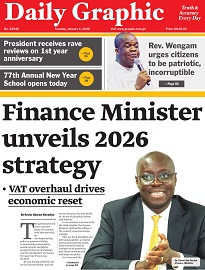Paradox of morality, government
Morality and government are subjects which are challenging and critical as they force societies to examine the intricate relationship between governance and the ethical principles that underpin their survival.
And in a country as diverse and dynamic as Ghana, understanding this connection is essential if we are to build a future that is just, equitable and flourishing.
The starting point to address the subject of morality and government is to acknowledge the deep-rooted historical and cultural context that shapes Ghana's governance and moral landscape.
Ghana, with its diverse traditions and values, has a rich tapestry of morals and ethics that have guided its people for generations.
These principles are deeply embedded in the fabric of communities, forming the very essence of Ghanaian identity.
From colonial rule to post-independence struggles, Ghana, like many African countries, has witnessed a tumultuous journey towards self-determination and good governance.
However, with the 1992 Constitution, numerous challenges have come up in translating these values into effective governance structures.
Challenges
Some of the fundamental challenges we face are the questions of accountability, corruption, nepotism and lack of transparency, which have plagued past and present governments, undermining their moral authority and eroding public trust.
Furthermore, the moral foundation of a government must extend beyond individual leaders and encompass the entire society.
This includes promoting inclusive decision-making processes that reflect the diversity of the population, protecting human rights, and ensuring equal access to justice and opportunities.
The distinction between the concepts of the country called Ghana, the nation and the state is fundamental to our understanding of the subject of morality and government.
Simply, the nation has ceded power to the state; even though the power belongs to the nationals as enshrined in the “Directive Principles of State Policy of the 1992 Constitution.
Therefore, to understand morality in governance, we must strive to reverse the trend now to give power back to the nationals completely; not only in votes, but also in inclusive governance.
The next step is to use education as a tool to address and shape morality and governance.
By investing in quality education systems, we equip our youth with the tools to think critically, make informed decisions, and hold their governments accountable.
Education fosters a culture of morality by nurturing a sense of responsibility, empathy and respect for others.
This is where the religious institutions come in to help in shaping the minds of the citizenry.
Moreover, the government must prioritise social and economic development for the most vulnerable members of society.
Poverty, inequality, and marginalisation are not only moral issues but also impediments to progress.
By addressing the root causes of these challenges, such as thorough sustainable economic policies, social safety nets and equitable distribution of resources, governments can lay the foundation for a morally just society.
Inherent
But how do we ensure that morality becomes an inherent part of the governance process? It starts with visionary leadership.
We need leaders who espouse ethical principles, lead by example, and prioritise the welfare of their people above all else.
These leaders must embrace transparency, accountability and integrity as fundamental pillars of governance.
In conclusion, the paradox of morality and government is a complex and challenging issue that requires the collective effort of society to address.
By recognising the historical and cultural context, prioritising accountability and inclusivity, investing in education and fostering visionary leadership, we can build a future where morality and government are seamlessly intertwined.
It is through these efforts that we can create a just equitable and flourishing society for all.
The writer is a filmmaker, advertising and marketing practitioner.
E-mail: Emantwi30@yahoo.com

